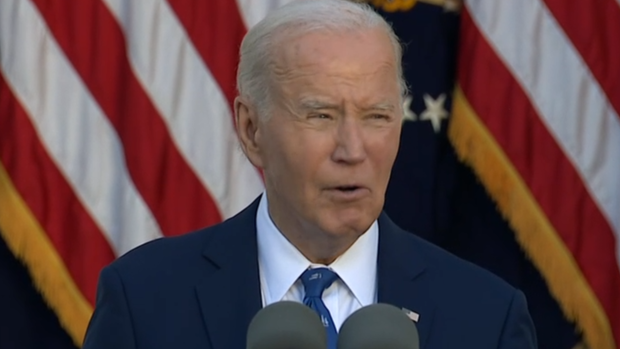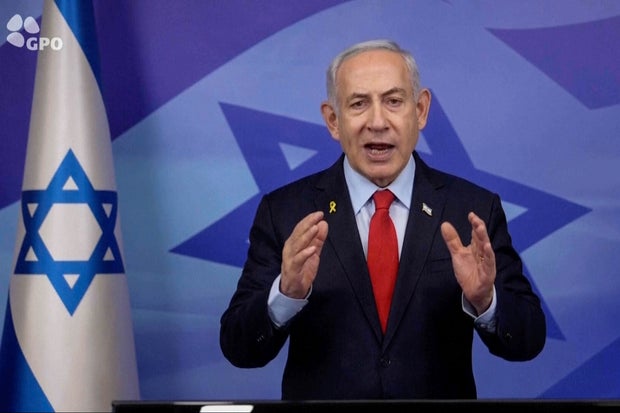President Biden announced a ceasefire to end the fighting between Israel and Hezbollah

President Biden announced on Tuesday that the US helped secure a ceasefire agreement in Lebanon, which will end the fighting between Israel and the Iran-backed terrorist group Hezbollah.
His announcement came as the Israeli Cabinet approved a ceasefire after urging Israeli Prime Minister Benjamin Netanyahu. A war between Israel and a group supported by Iran it has killed nearly 3,800 people in Lebanon last year and left some 16,000 others injured.
“Today, I have good news to report from the Middle East,” Mr. Biden said on the White House South Lawn. “I have just spoken with the prime ministers of Israel and Lebanon. I am pleased to announce that their governments have accepted the proposal of the United States to end the destructive conflict between Israel and Hezbollah. I would like to thank President Macron of France for his cooperation in reaching this moment.”
Under the agreement reached, a ceasefire will come into effect from 4 a.m. Wednesday local time and fighting across the Lebanese-Israeli border will “end,” Mr. Biden said. But as Mr. Biden pointed out, the ceasefire does not apply to the ongoing war between Israel and Hamas.
“This is designed to end hostilities once and for all,” he added. “The remnants of Hezbollah and other terrorist organizations will not be allowed, I stress, will not be allowed, to threaten Israel’s security again.”
CBS News
In the next 60 days, the Lebanese Army and national security will regain control, and Israel will gradually withdraw its remaining forces. Since the war with Hezbollah began, more than 70,000 Israelis “have been forced to live as refugees in their own countries,” Mr.
“Let’s be clear,” said Mr. Biden. “Israel did not start this war. The people of Lebanon did not want that war, neither did the United States.”
Echoing Netanyahu’s earlier words, Mr. Biden said that if Hezbollah or anyone else violates the agreement and poses a direct threat to Israel, then Israel retains the right to defend itself.
And in a joint statement later issued by Mr. Biden and French President Emmanuel Macron, the two leaders said that “the announcement today will stop the fighting in Lebanon, and protect Israel from the threat of Hezbollah and other terrorist organizations operating in Lebanon,” adding that “it will create the conditions to restore lasting calm and allow citizens in both countries to return safely to their homes on both sides of the Blue Line.”
Earlier on Tuesday, Netanyahu said that the war cabinet had approved the ceasefire, and urged ministers in the full cabinet to approve the agreement on Tuesday night. He did not provide details, but said that if Hezbollah violates the terms, Israel will “react strongly.”
Netanyahu said that the war cabinet had approved the ceasefire, and he urged the ministers in the full cabinet to approve the agreement on Tuesday night. He did not provide details, but said that if Hezbollah violates the terms, Israel will “react strongly.”
/AP
The Prime Minister of Lebanon, Najib Mikati, posted on social media that the international community “ended the shooting immediately.”
US Defense Department spokesman Patrick Ryder said Tuesday that “we strongly support the ceasefire.”
Under this agreement, a full and permanent suspension will begin immediately. There will be 60 days allowed for a complete withdrawal of Israeli troops – a gradual withdrawal to allow the Lebanese army to assemble and move in to secure the area, but the first period will come into effect on Tuesday.
The first withdrawal of Israeli soldiers was to begin within the next 10 days.
Hezbollah is expected to pull its forces and heavy weapons back about 20 miles from the Israeli border, to the Litani River.
An official in Netanyahu’s office told CBS News earlier on Tuesday that the prime minister called the national security cabinet to discuss the proposal. The cabinet must approve any ceasefire agreement. Netanyahu also held meetings on Tuesday in Tel Aviv with various government ministers, legislators and mayors of some northern cities that have been out for months.
The Lebanese government also had to ratify the deal on Tuesday, but a US official said that was expected. The ceasefire will end the deadliest war in Lebanon since the civil war, which ended in 1990.
Mr. Biden is expected to mention France when he speaks on Tuesday, at 2:30 pm ET, according to a US official. The French did not help negotiate this agreement, but will be part of its implementation.
The team of President-elect Donald Trump has been briefed and is closely monitoring the plan, according to an American official. Iran has also been briefed, given Tehran’s support for Hezbollah – the powerful military and political organization in Lebanon that has long been designated a terrorist group by the US and Israel.
“We are in the final stages of getting an agreement to stop Lebanon,” US Secretary of State Antony Blinken told reporters on Tuesday after meeting his G7 counterparts in Italy. “We’re not there yet, but I believe we’re in the final stages.”
“This has been a great negotiation effort by the United States, allies like France working with Israel, working with Lebanon, for many months,” said Blinken, “and if we reach the conclusion that I hope we will reach soon, It will make a big difference in saving lives and livelihoods, in Lebanon and -Israel It will make a big difference in creating the conditions that will allow people to return to their homes safely in northern Israel and southern Lebanon.
Hezbollah began firing rockets into Israel on Oct. 8, 2023, to support its militant Hamas allies. war in Gaza for their terrible attack the day before.
Israel has been conducting airstrikes against Hezbollah targets for months, but in September significantly increases its attack to the Iranian proxy group, including launching ground operations in southern Lebanon.
CBS News reporter Debora Patta said rockets were still flying on both sides on Israel’s northern border on Tuesday, with Israel and Hezbollah trading some of their heaviest fire to date, as diplomats sought peace.
Under the proposed agreement, the Lebanese army and United Nations (UN) peacekeepers are expected to jointly monitor southern Lebanon to ensure that the terms of the agreement are being followed. Earlier reports suggested that the southern region would be overseen by a multinational committee, which would include the US and France.
Middle East expert Danny Citrinowicz, a fellow at the Atlantic Council, said the agreement looks “good on paper,” but added that until it is implemented, “it would be difficult to know if Israel can really build on this kind of assurance from the American administration.”
After more than a year of shooting, more than 1.2 million people have left their homes in Lebanon, along with 60,000 from cities and towns in northern Israel. They all want to return home, and Israeli Prime Minister Benjamin Netanyahu has long said that the main purpose of the war with Hezbollah, from his government’s point of view, was to enable them to do so.
While an agreement with Hezbollah appears to be closer than ever, talks to end Israel’s war with Iran’s other proxies in the Gaza Strip, Hamas – have gone nowhere.
Blinken said on Tuesday that the de-escalation of the conflict in the region “may also help us end the conflict in Gaza.”
“Especially Hamas will know that it cannot rely on other sides opening up to war,” he said.
Many in the devastated Palestinian territories are starving, and recent rains have worsened living conditions there. The winter chill has set in, and there were reports of a new Israeli strike that killed at least 15 people on Tuesday in Gaza City.
Arden Farhi, Debora Patta and
contributed to this report.
Source link






